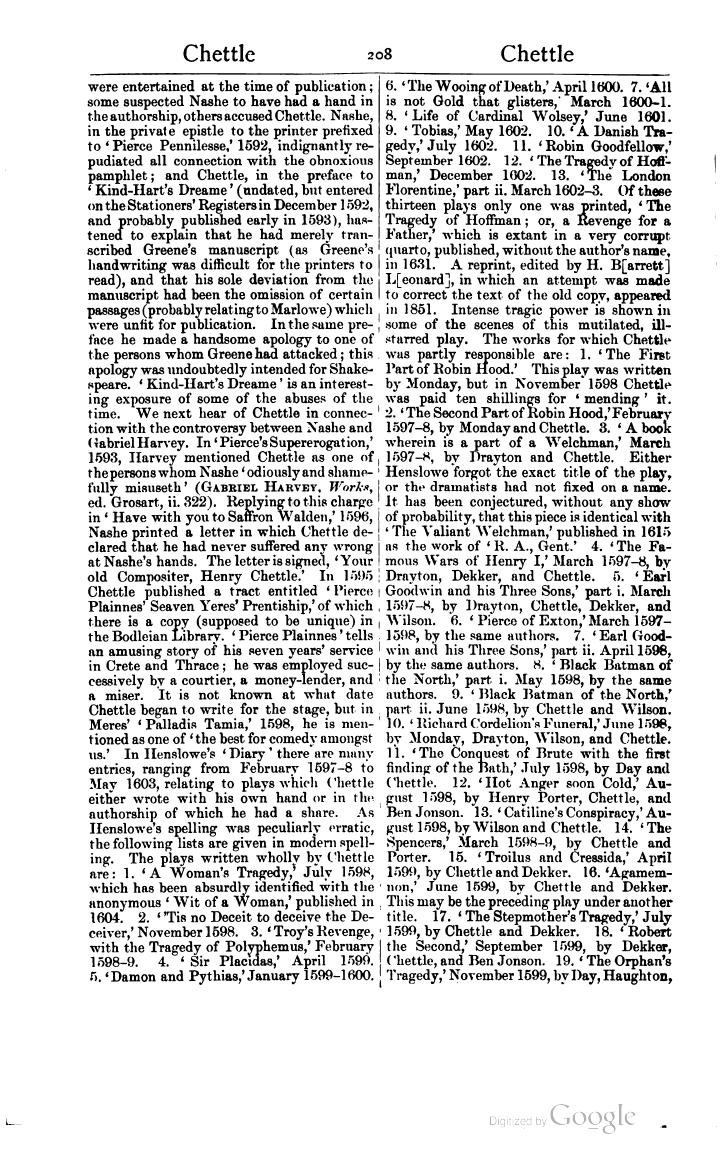were entertained at the time of publication; some suspected Nashe to have had a hand in the authorship, others accused Chettle. Nashe, in the private epistle to the printer prefixed to 'Pierce Pennilesse,' 1592, indignantly repudiated all connection with the obnoxious pamphlet; and Chettle, in the preface to 'Kind-Hart's Dreame' (undated, but entered on the Stationers' Registers in December 1592, and probably published early in 1593), hastened to explain that he had merely transcribed Greene's manuscript (as Greene's handwriting was difficult for the printers to read), and that his sole deviation from the manuscript had been the omission of certain passages (probably relating to Marlowe) which were unfit for publication. In the same preface he made a handsome apology to one of the persons whom Greene had attacked; this apology was undoubtedly intended for Shakespeare. 'Kind-Hart's Dreame' is an interesting exposure of some of the abuses of the time. We next hear of Chettle in connection with the controversy between Nashe and Gabriel Harvey. In 'Pierce's Supererogation,' 1593, Harvey mentioned Chettle as one of the persons whom Nashe 'odiously and shamefully misuseth' (Gabriel Harvey, Works, ed. Grosart, ii. 322). Replying to this charge in 'Have with you to Saffron Walden,' 1596, Nashe printed a letter in which Chettle declared that he had never suffered any wrong at Nashe's hands. The letter is signed, 'Your old Compositer, Henry Chettle.' In 1595 Chettle published a tract entitled 'Pierce Plainnes' Seaven Yeres' Prentiship,' of which there is a copy (supposed to be unique) in the Bodleian Library. 'Pierce Plainnes' tells an amusing story of his seven years' service in Crete and Thrace; he was employed successively by a courtier, a money-lender, and a miser. It is not known at what date Chettle began to write for the stage, but in Meres' 'Palladis Tamia,' 1598, he is mentioned as one of 'the best for comedy amongst us.' In Henslowe's 'Diary ' there are many entries, ranging from February 1597-8 to May 1603, relating to plays which Chettle either wrote with his own hand or in the authorship of which he had a share. As Henslowe's spelling was peculiarly erratic, the following lists are given in modern spelling. The plays written wholly by Chettle are: 1. 'A Woman's Tragedy,' July 1598, which has been absurdly identified with the anonymous 'Wit of a Woman,' published in 1604. 2. 'Tis no Deceit to deceive the Deceiver,' November 1598. 8. 'Troy's Revenge, with the Tragedy of Polyphemus,' February 1598-9. 4. 'Sir Placidas,' April 1599. 6. 'Dunon and Pythias,' January 1599-1600. 6. 'The Wooinff of Death,' April 1600. 7. 'All is not Gold that glisters,' March 1600-1. 8. 'Life of Cardinal Wolsey,' June 1601. 9. ' Tobias,' May 1602. 10. 'A Danish Tragedy,' July 1602. 11. 'Robin Goodfellow,' September 1602. 12. 'The Tradegy of Hoffman,' December 1602. 13. 'The London Florentine,' part ii. March 1602-3. Of these thirteen plays only one was printed, 'The Tragedy of Hoffman; or, a Revenge for a Father,' which is extant in a very corrupt quarto, published, without the author's name, in 1631. A reprint, edited by H. B[arrett] L[eonard], in which an attempt was made to correct the text of the old copy, appeared in 1851. Intense tragic power is shown in some of the scenes of this mutilated, ill-starred play. The works for which Chettle was partly responsible are: 1. 'The first Part of Robin Hood.' This play was written by Monday, but in November 1598 Chettle was paid ten shillings for 'mending' it. 2. 'The Second Part of Robin Hood,' February 1597-8, by Monday and Chettle. 3. 'A book wherein is a part of a Welchman,' March 1597-8, by Drayton and Chettle. Either Henslowe forgot the exact title of the play, or the dramatists had not fixed on a name. It has been conjectured, without any show of probability, that this piece is identical with 'The Valiant Welchman,' published in 1615 as the work of 'R. A., Gent.' 4. 'The Famous Wars of Henry I,' March 1597-&, by Drayton, Dekker, and Chettle. 5. 'Earl Goodwin and his Three Sons,' part i. March 1597-8, by Drayton, Chettle, Dekker, and Wilson. 6. 'Pierce of Exton,' March 1597-1598, by the same authors. 7. 'Earl Goodwin and his Three Sons,' part ii. April 1598, by the same authors. 8. 'Black Batman of the North,' part i. May 1598, by the same authors. 9. 'Black Batman of the North,' part ii. June 1598, by Chettle and Wilson. 10. ' Richard Cordelion's Funeral,' June 1598, by Monday, Drayton, Wilson, and Chettle. 11. 'The Conquest of Brute with the first finding of the Bath,' July 1598, by Day and Chettle. 12. 'Hot Anffer soon Cold,' August 1598, by Henry Porter, Chettle, and Ben Jonson. 13. 'Catiline's Conspiracy,' August 1598, by Wilson and Chettle. 14. 'The Spencers,' March 1598-9, by Chettle and Porter. 15. 'Troilus and Cressida,' April 1599, by Chettle and Dekker. 16. 'Agamemnon,' June 1599, by Chettle and Dekker. This may be the preceding play under another title. 17. 'The Stepmother's Tragedy,' July 1599, by Chettle and Dekker. 18. 'Robert the Second,' September 1599, by Dekker, Chettle, and Ben Jonson. 19. 'The Orphan's Tragedy,' November 1599, by Day, Hanghton
